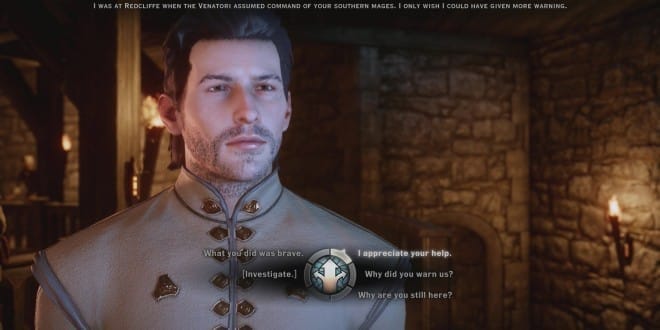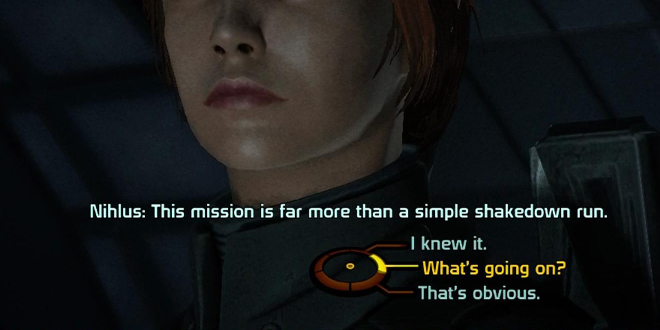It seems lately there is a growing number of people clamoring for non-violent games. Now obviously there are a large number of non-violent games already, from Tetris to Candy Crush. However violent games are usually the best selling and most profitable. And it's not hard to understand why, the struggle between life and death carries a dramatic weight that's hard to match.
However there are numerous stories that can be just as compelling. A prosecutor, who dispenses justice not through the barrel of a gun, but with compelling arguments made in court. An entrepreneur, whose success depends on negotiating the right deals. Or a close presidential race, where two opposing ideologies clash for control of a nation.
These stories can carry serious dramatic weight and can use entirely non-violent mechanics, and conversation mechanics would be a key part of it. There have been several election simulation games in recent years, which do an okay job of modeling things like raising funds and targeting ads, but every one of them fails to capture the drama of a political debate, and this is where a good system of conversation mechanics would be useful.
The simplest and most common conversation mechanic is a dialogue choice. The player character simply has two or more choices of what to say which will lead to different outcomes. This can be extended into a dialogue tree where each dialogue choice selected branches off into another choice, and this continues until the conversation reaches some sort of conclusion.
Dialogue trees have a serious weakness: they are static and predictable. They are more akin to taking a multiple choice test, than actually interacting with an intelligent human. I think dialogue trees can have their place, if you are just gathering information or learning the backstory of the game's world. But for really dramatic moments, dialogue trees are inadequate, and don't do justice to tense negotiation or debate.

Instead of having static characters, let's have dynamic ones, that respond differently to the player based on how they feel about him. Lets refer to this generically as disposition. Final Fantasy VII had affection points that would accumulate for different characters throughout the game based on dialogue choices, which would affect a major scene in the game. The Dragon Age series keeps track of various characters' approval of the player character's actions. The indie game Unrest takes this concept even further with 3 different disposition values: friendship, respect, and fear.
Now conversation becomes far more interesting than simply finding the right choice. Failure instead becomes a matter of degrees rather than simple pass/fail as disposition rises and falls throughout the conversation. You can even have complex situations where you must balance the disposition of multiple characters, which is perfect for negotiation scenarios.
A recent trend for dialogue mechanics is to systematize dialogue choices. What this means is that your available dialogue choices will fall into several types which recur regularly, and there is often one type that is appropriate for the situation. This is best characterized in the interrogations of L.A. Noire. There are always 3 options: to accept what the witness has said is truthful, to doubt them and press them for more information, or to outright accuse them of lying. There is always a single correct choice.
The dialogue wheel used in Mass Effect and later Dragon Age games is somewhat similar, there are different types of dialogue choices arranged by location on the wheel. Originally you had good choices at the top right, and bad choices at the bottom right, investigation on the left and so on. This system has changed little since it was introduced in the first Mass Effect, although in many cases there is no "correct" choice, unlike L.A. Noire, leaving the decision primarily to player expression.
This systematization aids the player by providing predictability. Just as in an JRPG battle you can decide whether to attack, use magic, or use an item based on the situation, this systematization of dialogue choices allows you make an informed decision about a particular dialogue choice. It might be based on the character's facial expression as is the case in L.A. Noire, or it might be based on information you learned about the character, or some other factors.

Another powerful but often overlooked tool would be to remove choices from the player in certain situations. The best example of this would probably be Depression Quest. It doesn't deal with dialogue choices specifically, but it is along similar lines to what's being discussed in this article so I think its worth looking into. The idea of removing choices could be very powerful indeed.
Depression Quest tracks a variable that determines which choices are crossed out and unavailable, which fits in pretty well with what I've talked about previously. We already have disposition variables for NPCs so why not have them for the player character as well. That specific game was tracking how depressed the player character was, but the same idea can be used in many ways. You can imagine a conversation tree where an NPC says something that makes the player character outraged, and removes dialogue choices to respond calmly.
What I consider to be the biggest failing of every conversation system, in every game that I have played, is that there is not really any kind of AI behind it. In almost every genre, from FPS to RPG to RTS, we have AI that react to the player and tries to counter them. It is far more compelling to compete against an AI opponent than a static system. So here's how I would imagine the next evolutionary step forward from today's conversation mechanics.
The player and the AIs have systematized dialogue options. The player has some way of gaining information on the AI characters to determine how they would react to different dialogue approaches. It doesn't have to be precise but at least enough information for the player to make informed decision. The player and the AI take turns making dialogue choices to try and change each other's disposition, which would be made up of several different variables. Based on the disposition certain options will become unavailable. After this battle of wits has concluded, the final disposition of both parties will determine whether the outcome is positive or not.
This idea heavily depends on well written dialogue that can cover many different dialogue pathways, but if executed well it would really capture the feeling of tense negotiations, and more importantly would capture the feeling that the person you are talking to is a living being working towards goals opposed to your own.
Feel free to leave your own thoughts on conversation mechanics below.
Have a tip, or want to point out something we missed? Leave a Comment or e-mail us at tips@techraptor.net













